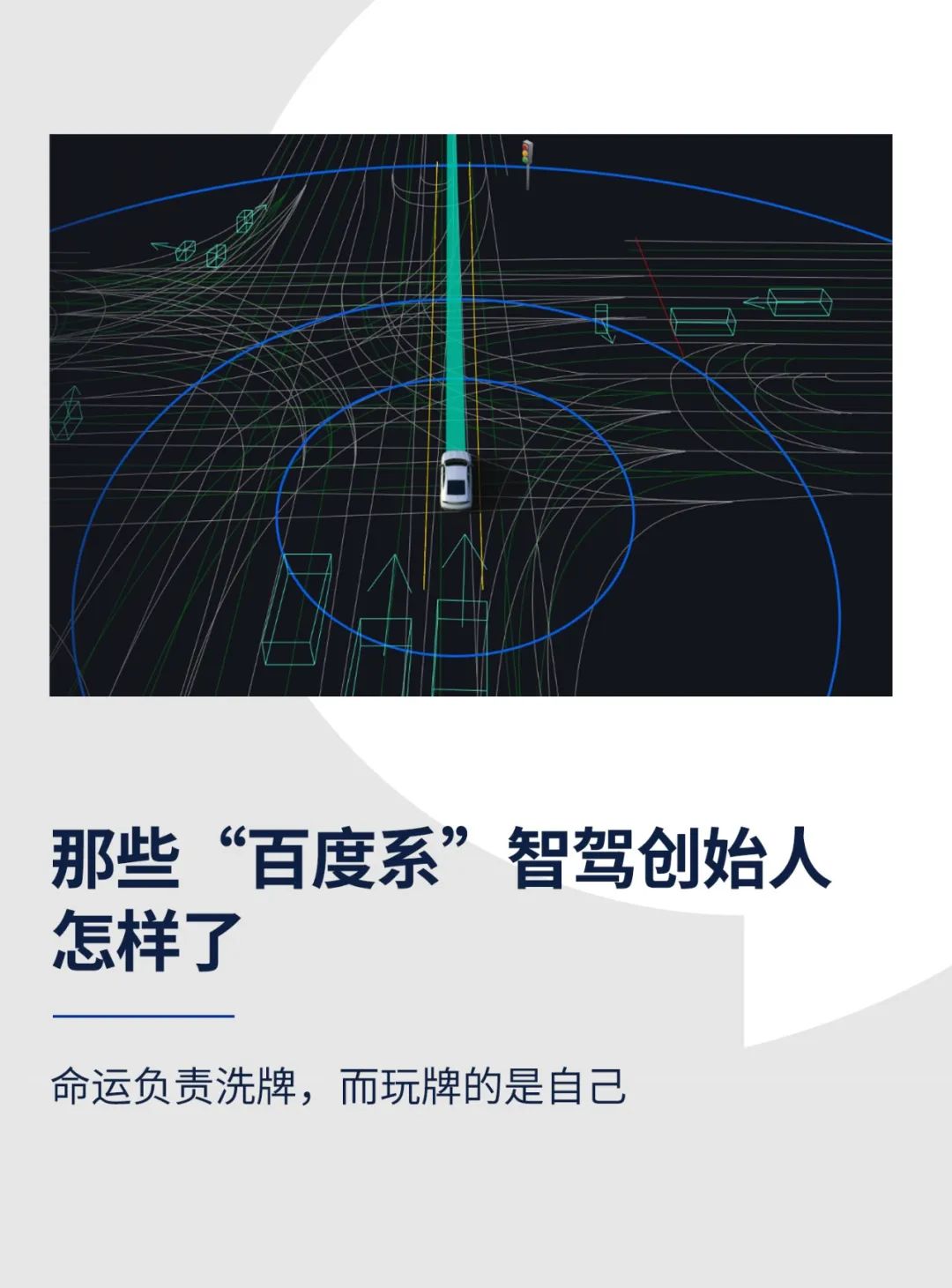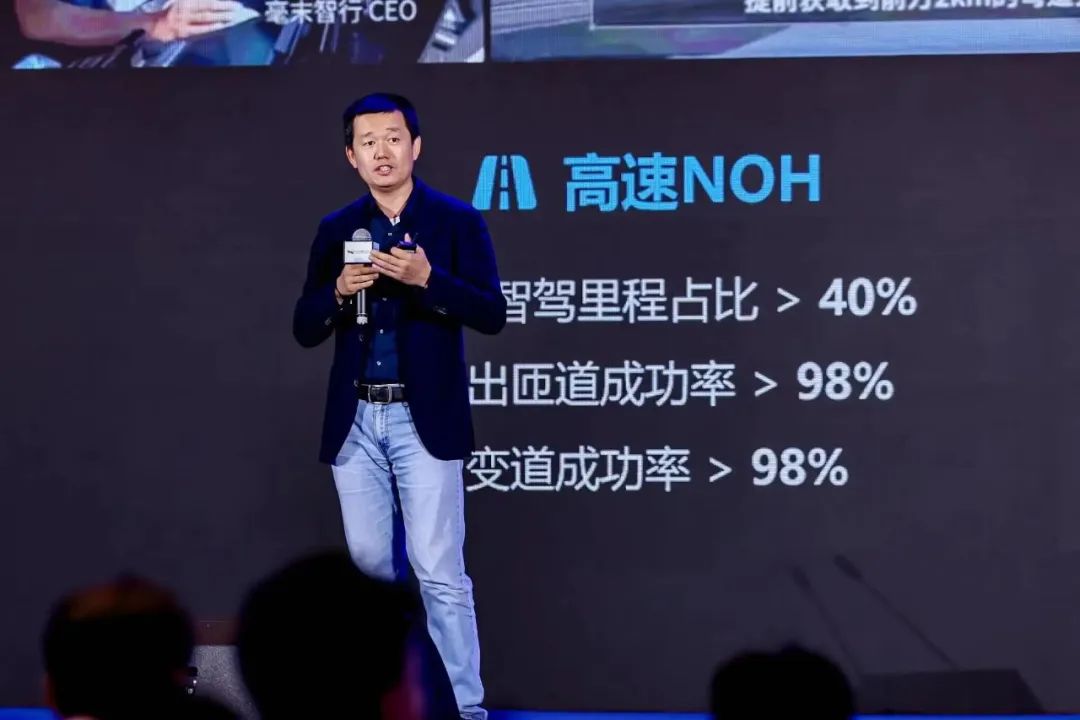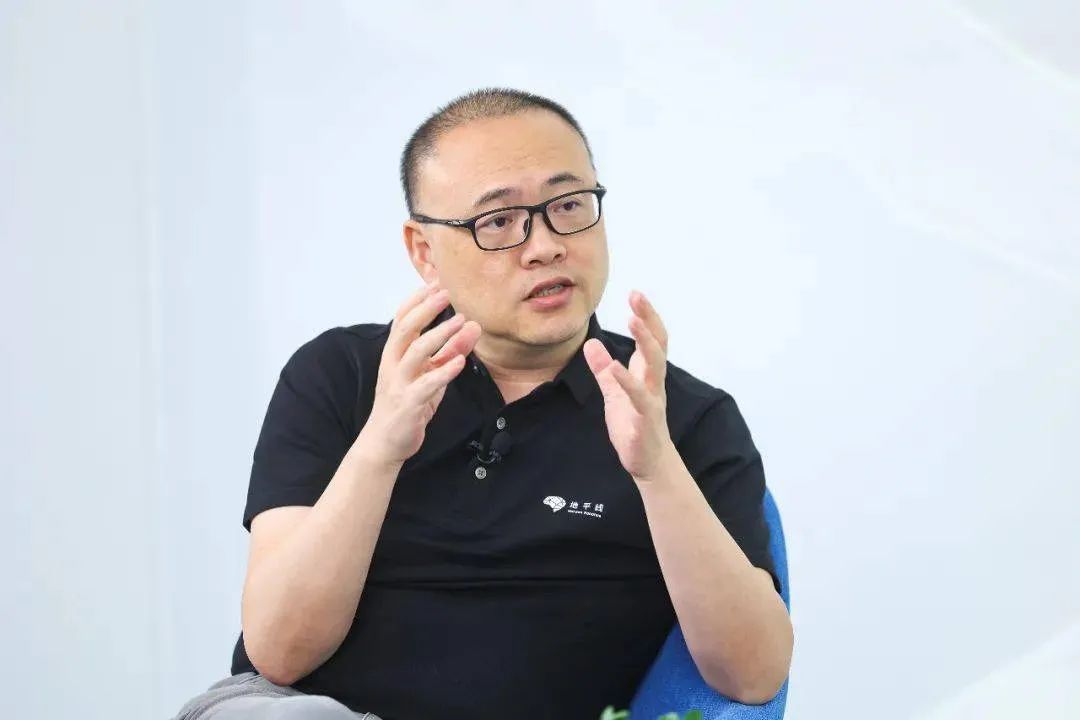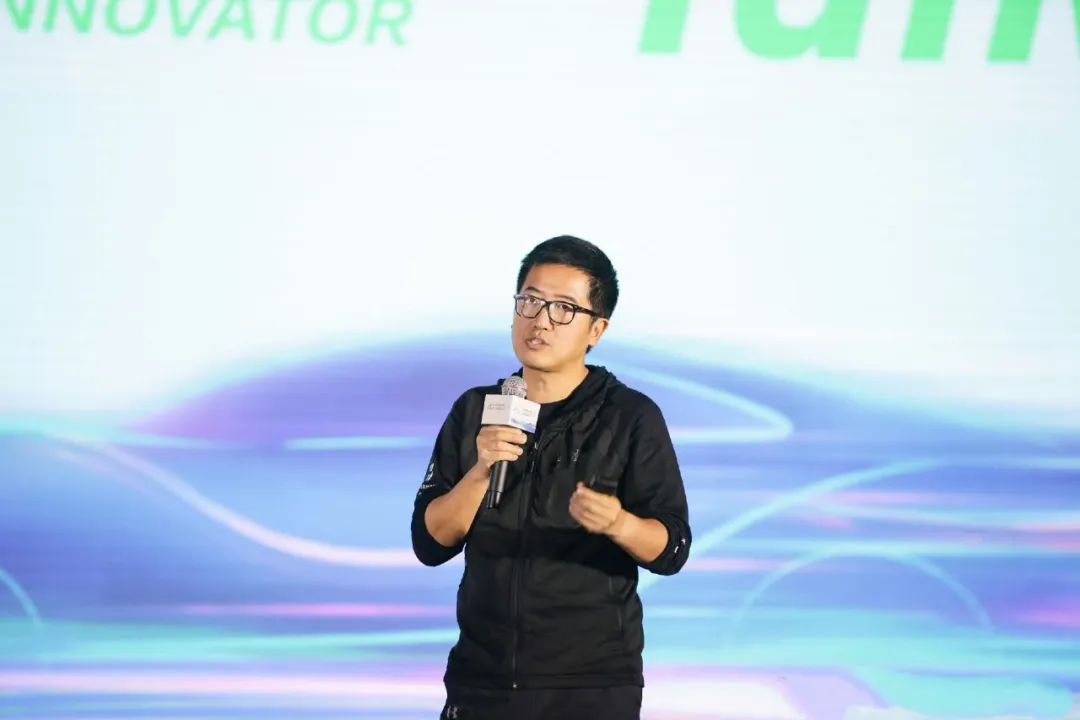What happened to the founders of those "Baidu-backed" intelligent driving companies?
![]() 11/28 2024
11/28 2024
![]() 660
660

Author | Yang Lu
Editor | Li Guozheng
Produced by | Bangning Studio (gbngzs)
Fate shuffles the cards, but we play them.
This year, the autonomous driving industry has rebounded overall, with new stocks emerging in the capital market and equipped models entering mass production. However, on the other hand, some intelligent driving companies have laid off employees and cut salaries, leading to closures.
Talent is always the key to industrial transformation. Baidu, the cradle of autonomous driving talent in China, nurtured the earliest batch of intelligent driving professionals. A significant portion of them later left Baidu to branch out and contribute to the birth of a number of autonomous driving companies. To date, they have embarked on different business paths and life trajectories, ranging from chips to algorithms.
After several years of evolution, what is the current status of these graduates from the "Whampoa Military Academy" of autonomous driving? How many of the once shining star companies remain? Who is still at the table?
01 Order Grabbers
Recently, Haomo.AI was rumored to have laid off a large proportion of its employees. The company responded that this was a normal organizational adjustment based on business development, aiming to focus on core businesses and customer delivery, reduce costs and increase efficiency, and continuously improve operational efficiency. A small number of personnel in functional departments were involved, and the proportion was relatively small.
Previously, Haomo.AI CEO Gu Weihao frequently appeared in public. His most recent appearance was a speech at the Future Auto Summit in June this year.
In 2021, Haomo.AI's office in Haidian, Beijing, was still under renovation. Gu Weihao accepted a media interview while eating fast food, presenting the image of a startup coder. When discussing future development, his eyes shone with determination.

▲Gu Weihao
As one of the representatives of intelligent driving talent who left Baidu, Gu Weihao started his entrepreneurial journey from a higher point. Although Haomo.AI exists independently as a startup, it has Great Wall Motor as a backer, leveraging this to become one of the earliest intelligent driving companies to achieve mass production.
Gu Weihao once benchmarked the "Great Wall + Haomo" model against "General Motors + Cruise," but this benchmark has now lost accuracy. Cruise has lost its former luster, experiencing several significant personnel changes this year, with two co-founders and executives resigning and about a quarter of the employees being laid off. The decline of this autonomous driving unicorn may also reflect the future of some Chinese intelligent driving companies.
One indication is that at this year's Guangzhou Auto Show, over 20 Canglangqing Blue Mountains were exhibited in formation on Great Wall Motor's booth, but the intelligent driving system they were equipped with was not from Haomo.AI but from another intelligent driving company, Yuanrong Qixing. The initial NOA system for Blue Mountain was provided by Haomo.AI. This switch by Great Wall Motor questions the development of Haomo.AI.
In October, Haomo.AI Chairman Zhang Kai denied plans to suspend the IPO and said it was expected to launch in 2025.
Yuanrong Qixing, which intercepted Haomo.AI's solution, completed a $100 million C1 round of strategic financing on November 5, exclusively invested by Great Wall Motor.
Coincidentally, Yuanrong Qixing founder Zhou Guang also comes from the Baidu system and once served as the head of perception fusion in Baidu's Autonomous Driving Business Unit at its US R&D center.
In the middle of this year, Yuanrong Qixing discussed an end-to-end intelligent driving project with BYD. Later, it was reported that this project had come to fruition, and that BYD had previously been in contact with another company, meaning that Yuanrong Qixing had also snatched a piece of the pie from someone else's mouth.
As for Zhou Guang himself, his experiences have been quite tumultuous. In 2017, after leaving Baidu, Zhou Guang co-founded Roadstar with Tong Xianqiao and Heng Liang. However, two years later, the trio fell out and ended up in court. In the evaluations of Tong Xianqiao and Heng Liang, Zhou Guang fits the characteristics of being "arrogant and narrow-minded," but opinions vary widely on the true nature of the conflict between the three.
In 2019, amid internal strife at Roadstar, its early investment institutions and core technical team established a new company, Yuanrong Qixing. In its Pre-A round of financing, the company raised $50 million, led by Fosun RZ Capital and followed by GSR Ventures, InnoVen Capital, Ventech China, and Songhe Capital, among others, basically the early investors of Roadstar. Yuanrong Qixing became a new starting point for Zhou Guang.

▲Zhou Guang
Initially, Yuanrong Qixing also followed the L4 autonomous driving route until 2022, when it shifted to developing pre-installed mass-produced L2 intelligent driving solutions. During the same period, many L4 companies either transformed into L2 or expanded into L2 businesses. This year, Yuanrong Qixing secured key cooperation from Great Wall Motor and BYD, two major OEMs, further boosting Zhou Guang's confidence.
In March this year, at the 2024 China Electric Vehicle 100 Conference, he even stated, "L4 is a scam!"
02 Listed Companies
In addition to securing project orders, going public is a common path to survival for all intelligent driving companies.
This year, Horizon Robotics and WeRide have successively listed on the Hong Kong and US stock exchanges, while Pony.ai is in the process of repricing. The founders of these three intelligent driving companies all come from the Baidu system.
Horizon Robotics founder and CEO Yu Kai personally established the company in 2015. Nine years later, on October 24, 2024, it became the largest technology IPO on the Hong Kong stock market this year, with a market value of nearly HK$70 billion at one point. Horizon Robotics was one of the earlier companies globally to propose and develop specialized neural network chips and later entered the field of hardware-software integration.
In 2021, with the launch of the Journey 3 chip in the new Ideal ONE, Horizon Robotics gained overnight fame. It is said that to promptly respond to Ideal Auto's needs at the time, Horizon Robotics dispatched a team of 300 people to stay at Ideal to solve problems together with their team. Amid the COVID-19 pandemic, the time difference and inconvenience of contact between domestic automakers and foreign suppliers provided Horizon Robotics with an opportunity to grow.

▲Yu Kai
Yu Kai is adept at communication and has always emphasized the importance of altruistic thinking in business. He once said, "From a final perspective, technological advantages are difficult to turn into solid advantages. What is more enduring than technological advantages are customer relationships, brands, and ecosystems."
It is reported that when BYD sent a team to learn from Horizon Robotics, the latter not only opened its code and development tools but also provided internal training and joint development projects for over 100 visitors.
During the growth stage of domestic autonomous brands, Horizon Robotics seized the opportunity of intelligent driving and worked closely with domestic OEMs to carve out a niche for itself.
The IPO timelines of the other two companies were later than expected.
WeRide, which initially focused on L4 autonomous driving, was seen by many as the first to have the opportunity to go public.
It was not until October 25, 2024, that WeRide listed on Nasdaq, one day after Horizon Robotics.
In the field of autonomous driving, WeRide is still considered the first "Robotaxi" stock in China among listed companies. Among the already listed Chinese enterprises: TuSimple has been called the "first autonomous driving stock," but it mainly operates driverless trucks and has since delisted. Zhixing Technology, although in the autonomous driving industry, mainly focuses on domain control products, while Black Sesame Technologies and Horizon Robotics are chip companies.

▲Han Xu (right)
WeRide founder and CEO Han Xu was also part of Baidu's self-driving team at the American Research Center, sharing similar experiences and backgrounds with Zhou Guang, Peng Jun, Lou Tiancheng, and others. WeRide investor China Growth Capital said that for a company like WeRide, the core is its technical assets, and the most influential figure for these assets is Han Xu.
Han Xu enjoys reading history books and likes to compare situations to war stories. In 2021, he pointed out that China's autonomous driving industry lacked a competition arena. Xiong Weiming, a partner at China Growth Capital, said that WeRide's ability to survive and thrive to this day is mainly due to the resilience of its team, for which Han Xu deserves much credit. Although Han Xu can sometimes be tough, his perseverance is a quality that has brought him to where he is today.
Like WeRide, Pony.ai, which has not abandoned the L4 route, also submitted an IPO prospectus to Nasdaq this year, originally planning to go public on November 21 but postponing due to pricing issues. Insiders revealed that the reason was the large subscription volume.
Founded by Peng Jun and Lou Tiancheng, Pony.ai has always pursued L4 autonomous driving and still believes that L2 and L4 are separate entities, despite opposition from other autonomous driving talents.
03 The Invisible Ones
There are still some founders of intelligent driving companies who have left Baidu, but most of them have gradually faded or disappeared amid rounds of changes.
In August this year, Hodo Tech, an intelligent driving solution provider founded by Ni Kai, experienced a shortage of funds, with the company defaulting on salaries for multiple months and dissolving multiple core departments, plunging it into a difficult situation.
The fuse that led to Hodo Tech's downfall was the failure of its reorganization with GAC Group. According to reports, in July this year, Hodo Tech and GAC Group discussed a reorganization plan, where Hodo Tech would establish a new enterprise with capital injection from GAC Group. The new company would primarily provide intelligent driving solutions for GAC Group's brands. However, this plan did not receive support from all shareholders.
In 2021, Hodo Tech began cooperating with GAC Group and received three rounds of investment totaling approximately RMB 400 million, accounting for about 13% of its shares. Hodo Tech provided intelligent driving solutions for models such as Aion, Trumpchi, and Hyper GT. For example, it delivered a high-level intelligent driving solution for GAC's Hyper GT model, but monthly sales of this model did not exceed 1,000 units, and less than half of the sales were of high-end models equipped with intelligent driving solutions.
According to China's Executive Information Disclosure Network, Hodo Tech has been listed as an executed person by courts in Haidian, Beijing; Suzhou, Jiangsu; and Huadu, Guangzhou, involving amounts totaling nearly RMB 750,000.

▲Ni Kai
After Hodo Tech's dissolution, rumors circulated that Ni Kai had joined NavInfo. Indeed, before founding Hodo Tech, Ni Kai briefly served as the head of NavInfo's autonomous driving business. However, this information was not true.
More than one person has evaluated Ni Kai as "more like a CTO than a CEO." A former Hodo Tech employee told Bangning Studio that Ni Kai had no bossy attitude and was willing to share his ideas. As a technical expert in the field of autonomous driving, as the company continued to grow, Ni Kai revealed deficiencies in business management and governance. Amid the backdrop of industry evolution, this became a fatal flaw for Hodo Tech. While Ni Kai and Hodo Tech's failure is regrettable, there are also some unassuming entrepreneurs who inspire respect, such as lidar company Innovusion, whose founder Bao Junwei comes from Baidu's American R&D center, and L4 autonomous trucking company Mainline, whose founder also hails from Baidu's Deep Learning Institute...
During the lidar boom, Innovusion failed to catch the wave of listings. Compared to listed lidar companies such as Hesai Technology and RoboSense, Innovusion remains relatively low-key. In terms of business, it has deep cooperation with NIO, which invested in it as early as 2018 and has made multiple subsequent investments.
NIO's first self-developed chip, "Yang Jian," was co-developed with the Innovusion team, led by NIO and involving about 10 Innovusion employees. This was the first chip that Bao Junwei directly participated in developing. This shows that finding the right partner is crucial for a startup, even determining its survival.

▲Bao Junwei
With the financing recovery this year, Mainline also secured a new round of financing in May, jointly invested by industrial capital Civil Aviation Investment Fund and government funds Shunchuang Industrial Investment and Changzhou Zhonglou Jinkong. The financing amount was in the hundreds of millions of yuan. In the autonomous driving sector, Mainline has carved out a unique path by focusing on the relatively closed scenarios of ports and trunk logistics, which are more conducive to the implementation of autonomous driving technology.
On August 13, Fortune released its list of "China's 40 Under 40 Business Elite," including Zhang Tianlei, the 38-year-old founder and CEO of Mainline.
The autonomous driving boom continues, but the players are heading in different directions.






